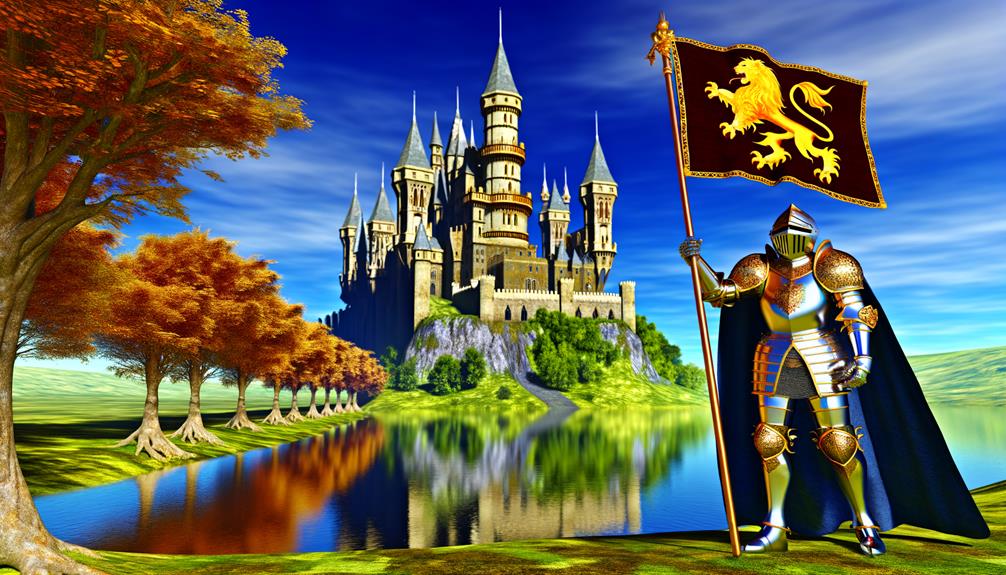Charles Name Meaning and Origin
The name Charles originates from the Germanic 'Karl,' meaning 'free man' or 'man of the people.' Its historical roots trace back to Charlemagne, enhancing its association with royalty and leadership. In various languages, Charles appears as 'Carlos' in Spanish and 'Carolus' in Latin, showcasing its phonetic diversity.
The name's cultural significance is evident in literature, with notable characters and enduring appeal in Western traditions. Historically, leaders named Charles have greatly influenced politics and society.
Recently, the name Charles has seen a resurgence in popularity, chosen for its classic and sophisticated connotations. Explore further for more insights. The origin and meaning of name Edward also carry significant historical and cultural weight. Derived from the Old English name ‘Eadweard,’ it translates to ‘rich guard’ or ‘wealthy protector.’ Like Charles, Edward has been associated with nobility and strength, with notable figures shaping history and literature. The resurgence of popularity for classic names like Charles and Edward reflects a timeless appeal and a connection to tradition.

Key Takeaways
- The name Charles originates from the Germanic name Karl, meaning 'free man' or 'man of the people.'
- Charles gained prominence through historical figures like Charlemagne, symbolizing leadership and nobility.
- The name underwent transformations across languages, becoming 'Carolus' in Latin and 'Carlos' in Spanish.
- It has been associated with royalty, with monarchs like Charles V and Charles III of Spain.
- Modern usage of Charles remains popular, with diminutives like Charlie and Chuck showcasing its adaptability.
Historical Roots
The name Charles has its origins in the Germanic name Karl, which was derived from a term meaning 'free man' or 'man of the people.' This nomenclature gained prominence through its association with significant historical figures, such as Charlemagne (Charles the Great), who unified much of Western Europe during the early Middle Ages.
The enduring legacy of Charlemagne contributed to the widespread adoption of the name across various cultures and languages. Its use permeated through monarchies, notably in France and England, where it became emblematic of leadership and nobility.
The historical context in which the name was propagated underscores its association with authority and governance, reflecting the societal values and hierarchical structures of medieval European civilization.
Etymology
Intriguingly, the etymology of the name Charles reveals a rich tapestry of linguistic evolution, deriving from the Germanic word 'karl' which signifies 'free man' or 'man of the people.' This term underscored a societal differentiation, emphasizing a status distinct from nobility and servitude.
As the name migrated through different cultures, it underwent phonetic and orthographic transformations. In Old English, 'Ceorl' maintained the original connotation, while in Old High German, it became 'Karl.' The name's adoption into Latin as 'Carolus' further facilitated its spread across Europe.
Over centuries, the name evolved, eventually becoming 'Charles' in modern English. This evolution highlights the dynamic interplay of linguistic and cultural influences shaping personal nomenclature.
Royal Connections
Many monarchs throughout history have borne the name Charles, illustrating its longstanding association with royalty and governance. From Charlemagne, the King of the Franks and Lombards, to Charles V, the Holy Roman Emperor, and Charles III of Spain, the name has been integral in shaping European history. This legacy is not confined to continental Europe; in the United Kingdom, Charles I and his son, Charles II, played pivotal roles during the English Civil War and Restoration. The name's royal connections are further evidenced by the current British monarch, King Charles III.
| Monarch | Reign | Notable Achievements |
|---|---|---|
| Charlemagne | 768-814 (King); 800-814 (Emperor) | United much of Europe |
| Charles V | 1519-1556 (Emperor) | Expanded the Holy Roman Empire |
| Charles II (UK) | 1660-1685 | Restoration of the monarchy |
This table highlights key figures named Charles who have left indelible marks on history.
Cultural Significance
Beyond its royal connections, the name Charles also holds significant cultural weight, influencing literature, arts, and societal norms across various historical contexts.
In literature, iconic characters such as Charles Darnay from Charles Dickens' 'A Tale of Two Cities' and Charles Bovary from Gustave Flaubert's 'Madame Bovary' highlight the name's pervasive presence.
In the arts, figures like Charles Baudelaire, whose poetry revolutionized 19th-century French literature, underscore its influential role.
Socially, the name has been a staple in Western cultures, often symbolizing nobility and integrity. Its frequent use in naming conventions reflects societal reverence for its historical and cultural resonance.
Therefore, the name Charles extends beyond mere nomenclature, embedding itself deeply within the cultural fabric.
Variations Across Languages
The name Charles exhibits a fascinating array of adaptations across different languages, reflecting both linguistic and cultural nuances.
For instance, in Spanish-speaking countries, it transforms into Carlos, while in French, it becomes Charles with a distinct pronunciation.
These global variations not only highlight the phonetic diversity but also underscore the widespread appeal and integration of the name across various societies.
Global Name Adaptations
Although the name Charles is rooted in French and Germanic origins, its adaptations across various languages reveal a rich tapestry of cultural influences and linguistic transformations. This name's versatility is evident in its numerous global variations, showcasing the unique phonetic and orthographic characteristics of each language. For instance, in Spanish-speaking countries, Charles is often rendered as "Carlos," while in Italy, it transforms into "Carlo." In Slavic languages, the name frequently appears as "Karel" or "Karol," reflecting regional phonological preferences. Below, a table illustrates some of these adaptations:
| Language | Adaptation |
|---|---|
| Spanish | Carlos |
| Italian | Carlo |
| Czech/Polish | Karel/Karol |
These variations underscore the name Charles's broad cultural resonance.
Pronunciation Differences Globally
Examining the pronunciation differences of the name 'Charles' across various languages reveals intricate phonetic nuances that reflect diverse linguistic traditions.
In English, 'Charles' is typically pronounced as /tʃɑːrlz/ with a soft 'ch' sound.
In French, 'Charles' is rendered as /ʃaʁl/, where the 'ch' takes on a 'sh' sound, and the final 's' is silent.
Meanwhile, in German, 'Karl'—a cognate of 'Charles'—is pronounced /kaʁl/, emphasizing a hard 'k' at the beginning.
Spanish speakers might adapt 'Charles' to 'Carlos', pronounced /'kaɾlos/, incorporating a trilled 'r'.
These variations not only highlight phonetic shifts but also underscore cultural adaptations, making 'Charles' a fascinating study in linguistic diversity.
Famous Bearers
The name Charles has been borne by numerous notable individuals, spanning various domains such as royalty and nobility, literature, and historical leadership.
Prominent figures include King Charles I and Charles Dickens, whose contributions have left an indelible impact on their respective fields.
Analyzing these bearers can provide deeper insights into the historical and cultural significance of the name Charles.
Royalty and Nobility Connections
Throughout history, the name Charles has been prominently borne by numerous influential figures within the domains of royalty and nobility, underscoring its enduring legacy and prominence. This name has been associated with various monarchs and noblemen who have made significant historical impacts. For instance, Emperor Charlemagne, or Charles the Great, unified much of Western Europe during the early Middle Ages. King Charles I of England was a pivotal figure in the English Civil War, while King Charles II restored the monarchy after a period of republican rule.
| Name | Title | Era |
|---|---|---|
| Charlemagne | Emperor of the Carolingian | 8th-9th Century |
| Charles I | King of England | 17th Century |
| Charles II | King of England | 17th Century |
These figures exemplify the name's historical prestige.
Literary Figures Named Charles
In literature, the name Charles has been carried by numerous distinguished authors and characters, contributing immensely to the literary canon with their influential works and enduring legacies.
Charles Dickens, a titan of Victorian literature, crafted timeless novels such as 'Great Expectations' and 'A Tale of Two Cities,' leaving an indelible mark on English literature.
Charles Baudelaire, a seminal French poet, revolutionized poetry with his collection 'Les Fleurs du mal,' influencing modernist movements.
Additionally, Charles Perrault, a pivotal figure in fairy tales, authored stories like 'Cinderella' and 'Sleeping Beauty,' which have permeated cultural consciousness.
These literary figures named Charles have not only enriched the world of letters but also shaped the narrative forms and themes that resonate through generations.
Influential Historical Leaders
Among the pantheon of historical leaders, several individuals named Charles have wielded substantial influence, shaping political landscapes and altering the course of history. Their leadership and decisions have left indelible marks in various eras, from medieval times to the modern world.
| Name | Contribution |
|---|---|
| Charlemagne | United much of Western Europe during the early Middle Ages and laid the foundations for modern France and Germany. |
| Charles I of England | His reign led to the English Civil War and ultimately his execution, which had a profound impact on the British monarchy. |
| Charles de Gaulle | Led the Free French Forces during WWII and later founded the Fifth Republic, markedly shaping modern France. |
| Charles V, Holy Roman Emperor | Ruled a vast empire and was a key figure in the politics of 16th-century Europe. |
These leaders named Charles have undeniably left an enduring legacy.
Popularity Trends
The name Charles has experienced fluctuating levels of popularity over the decades, reflecting broader societal trends and cultural influences.
In the early 20th century, Charles was a dominant choice, frequently appearing among the top ten names for boys in the United States.
The mid-century saw a gradual decline, influenced by evolving naming conventions and a shift towards more modern or unique names.
Despite this, Charles never fell out of favor entirely, maintaining a steady presence within the top 100.
In recent years, the name has seen a resurgence, possibly attributed to a renewed appreciation for classic, timeless names.
This resurgence underscores the enduring appeal of Charles, illustrating its versatility and historical gravitas in the ever-changing landscape of baby names.
Literary References
Literary works throughout history have frequently featured the name Charles, reflecting its widespread recognition and cultural resonance. This name has been employed by numerous authors to convey a range of character traits and social statuses, contributing to its rich literary heritage.
Notable examples include:
- Charles Darnay: A protagonist in Charles Dickens' 'A Tale of Two Cities,' embodying themes of sacrifice and duality.
- Charles Bovary: The husband in Gustave Flaubert's 'Madame Bovary,' representing mediocrity and societal expectations.
- Charles Ryder: The narrator in Evelyn Waugh's 'Brideshead Revisited,' exploring themes of nostalgia and faith.
- Charles Marlow: The protagonist in Joseph Conrad's 'Heart of Darkness,' symbolizing the journey into the unknown.
- Charles Wallace: A gifted child in Madeleine L'Engle's 'A Wrinkle in Time,' showcasing intellectual brilliance and vulnerability.
These characters highlight the name's versatility and enduring appeal in literature.
Modern Usage
In contemporary society, the name Charles remains prevalent, reflecting its enduring appeal across various cultures and demographics. This timeless name is frequently chosen for its classic and sophisticated connotations. Statistically, Charles holds a steady position within popular baby name rankings, evidencing its sustained popularity.
Its usage spans from formal contexts, such as professional and academic environments, to informal settings, maintaining versatility. The name's adaptability is further demonstrated in its numerous diminutives, including Charlie and Chuck, which offer more casual alternatives.
High-profile individuals, such as Charles, Prince of Wales, and influential figures in various fields, continue to bolster the name's prominence. Consequently, Charles remains a favored choice, signifying both tradition and contemporary relevance.
Conclusion
The name Charles, like a timeless tree with roots digging deep into historical soil, stands as a symbol of regal authority and cultural resonance. Examining its etymological branches and royal connections illuminates a name that has weathered centuries, flourishing across languages and societies.
Its presence among notable figures and in literary works further solidifies its enduring legacy. Therefore, the name Charles, through its rich tapestry of meanings and associations, remains a venerable emblem of historical and cultural significance.






